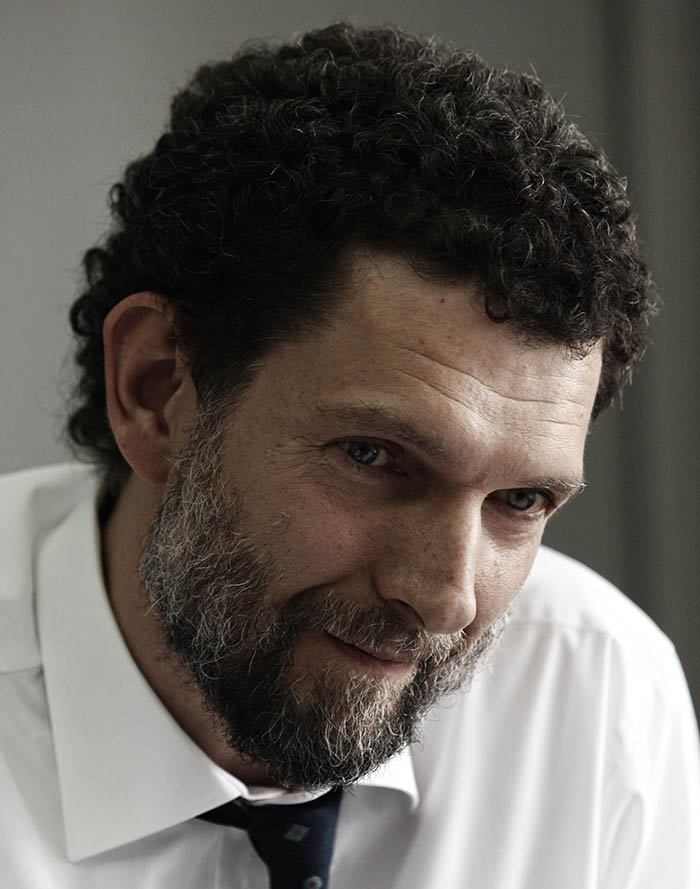[vc_row][vc_column][vc_column_text]

Osman Kavala. Credit: Anadolu Kültür
On 19 October, when police officers detained Osman Kavala, a left-wing Turkish human rights activist and businessman who funds a variety of cultural and civil society activities, I was set to catch a plane en route to Armenia to attend a conference. The news was extremely bothersome as I, having held a civil society job for two years, knew all too well what his detention entailed. As Andrew Finkel, an executive of the Independent Platform for Journalism (P24) commented, his detention and later arrest was “a chilling signal to those working in the civil society community”.
I never knew Kavala personally, but always respected him for allowing civil society organisations to use his centrally-located Cezayir Restaurant for events and gatherings, usually at a minimal charge. I tried not to think about what I understood to be a new low in Turkey’s recent descent into authoritarianism and had managed to completely forget about it by the time I had reached the beautiful mountain resort of Arghevan. Yet my fellow conference attendees were quick to remind me of what had happened at home earlier in the day. Several people greeted me saying they had heard the news; that they were extremely concerned about their friend Osman. “He has more friends in Armenia than he has in Turkey,” Armen Ohanyan, an Armenian writer, told me.
This, of course, owes to Kavala’s commitment to Turkish-Armenian reconciliation. He has been committed to improving the troubled relations between the two neighbours stemming from a number of factors, but mainly from Turkey’s unwillingness to recognise the Armenian Genocide. However, repairing ties was not the only area where Kavala worked. Anadolu Kültür, a foundation he established, has carried out many cultural projects including restoration of minority heritage. He has also been an active supporter of children’s, women’s and LGBT rights. The foundation was recently involved in a project for integrating Syrian refugees into Turkish society.
Dozens of articles from his friends followed his arrest and from them we learn that, unlike most of Turkey’s elite, this wealthy businessman not only talked about the most problematic affairs of his country but actively put time and effort into resolving them. He remained committed to pursuing that goal until it was too much for the government. Perhaps he was not a saint or some modern-day sage who devoted his life to others, but he was a good man; a “good citizen” as the son-in-law of a general, who was imprisoned in a past crackdown led by prosecutors who were part of the Fethullah Gülen network which today the Turkish government accuses of being behind the 2016 coup attempt, called him.
Ironically, Kavala was arrested two weeks after his detention by an Istanbul court on the basis of a prosecutor’s allegation that he was linked with the “parallel structure” FETÖ/PDY — or the Fethullahist Terrorist Organisation — the name Turkish authorities give to Gülen network.
The prosecution accuses Kavala of “attempting to overthrow the government” by supporting Turkey’s Gezi Park protests — massive peaceful anti-government demonstrations that took place in all provinces across the country four years ago. His arrest was not a surprise and president Erdogan called Kavala an “agent” and the “Soros of Turkey” in the few hours following his initial detention.
In a statement he made while in prison on 6 November 2017, Kavala said it was Erdogan’s statements that led to his arrest. “My arrest is part of the government’s attack on all opposition,” he told a visiting deputy.
The charges against him are bogus, as Sedat Ergin, the former editor-in-chief of the Hürriyet daily, explained at length in a column which was translated into English. On 9 November, prominent European diplomats and politicians, including Carl Bildt, Claus Offe and others, wrote to the Financial Times, of the ridiculousness of the charges against him.
Whether there will be an unexpected yet helpful twist in the course of his proceedings as was the case of the eight human rights defenders who were released conditionally have yet to be seen. However, his treatment so far clearly shows that darker times are ahead for civil society.
On 8 November the Checks and Balances Network (DDA), an umbrella network for more than 100 civil society organisations, made a timid statement denouncing reports labeling it as a supporter of foreign agents, following news stories in the pro-government media which stated that the National Endowment for Democracy (NED) funded network is an arm of the CIA. Other civil society organisations that are involved in non-political activities are also extremely concerned.
What makes Kavala’s arrest so pervasive is that it sends the message that the government has not been satisfied by the level of the crackdown it has already imposed on civil society. A total of 1,125 associations and 41 foundations were shut down under cabinet decrees since the declaration of the post-coup attempt state of emergency. Civil society leaders, who might have spoken out on Kavala’s arrest or not, now understand that Erdoğan may resort to Putin-like measures, banning civil society activities entirely and labelling its representatives as “foreign agents”.
That fear echoed in the initial remarks of Kavala’s academic and activist wife Ayşe Buğra, who said in a statement she made after her husband’s arrest: ““With the arrest ruling we have not only lost Osman Kavala’s freedom but at the same time our hopes in democracy, peace and the rule of law.”[/vc_column_text][/vc_column][/vc_row][vc_row][vc_column][vc_basic_grid post_type=”post” max_items=”4″ element_width=”6″ grid_id=”vc_gid:1510241893657-0016a8b6-b819-2″ taxonomies=”7355″][/vc_column][/vc_row]




